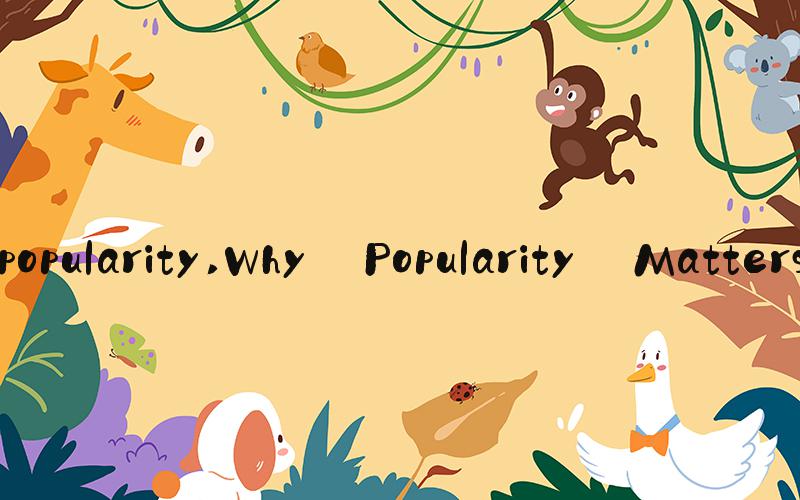
Introduction
Popularity is a term used to describe the state of being liked, admired, or enjoyed by many people, or the quality of being interesting or exciting to a large number of people. It is something that is often sought after and valued in various aspects of life, whether it be in entertainment, politics, or social circles. Understanding the concept of popularity, why it is important, and how it can affect people and society as a whole is crucial in our increasingly interconnected world.
Why Popularity Matters
Popularity matters for a variety of reasons. For individuals, being popular can bring about a sense of social validation, increase self-esteem, and provide social and career opportunities. In many cases, being popular can also mean having a larger support system and access to more resources, which can be especially important in times of need.
At a societal level, popularity can have a significant impact on the way people think and behave. Popularity can influence everything from the media and entertainment industries to political campaigns and public opinion. Trends and opinions that are popular can often become the norm, influencing policies and decision-making at a local and global level.
The Downside of Popularity
While being popular can have its benefits, there are also potential negative consequences that come with popularity. For individuals, the pressure to maintain a certain image or reputation can be overwhelming and lead to stress and burnout. Additionally, being popular can sometimes lead to a lack of authenticity, as individuals may feel the need to conform to certain expectations in order to maintain their popularity.
At a societal level, popularity can sometimes result in a lack of diversity and representation. Trends and opinions that are popular may not necessarily be representative of a diverse range of perspectives and experiences. Additionally, the pressure to conform to popular trends or opinions can sometimes stifle innovation and creativity.
The Role of Social Media in Popularity
Social media has had a significant impact on the way popularity is measured and perceived in our society. Platforms such as Instagram, TikTok, and Twitter have made it easier than ever for individuals to cultivate a public persona and gain followers. This has led to a new type of celebrity culture, where individuals can become famous simply by being popular on social media.
However, social media has also played a role in amplifying the negative aspects of popularity, such as the pressure to conform to certain beauty standards or the potential for cyberbullying. Additionally, the algorithms used by social media platforms can create echo chambers, where popular opinions and trends are constantly reinforced, leading to a lack of diversity and the potential for groupthink.
The Future of Popularity
The concept of popularity is constantly evolving and is likely to continue to do so in the future. As our society becomes increasingly interconnected and globalized, the way we measure popularity may shift to include a more diverse range of voices and perspectives. Additionally, advancements in technology may result in new ways for individuals to gain popularity, such as through virtual reality or augmented reality experiences.
Ultimately, whether we value popularity or not, it is important to understand its impact on individuals and society as a whole. By recognizing the potential benefits and downsides of popularity, we can work towards creating a more inclusive and authentic society that values diversity and innovation over conformity and sameness.

